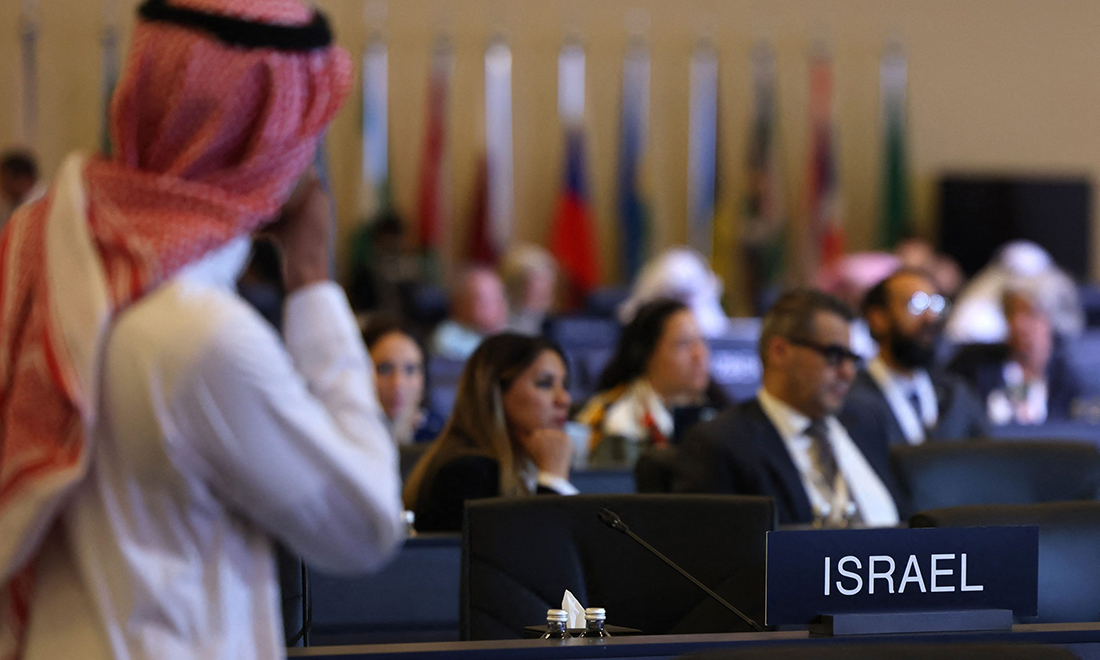
本周末,以色列局势的升级将对其外交政策以及整个中东局势带来重要影响。以色列政府此前一直在积极探讨与沙特建立外交关系的正常化。以色列和沙特均为美国的亲密盟友。作为中东地区的两大强国,几十年来两国之间的关系一直相当疏远,甚至曾达到敌对的程度。若两国能够达成协议,将成为一项具有重要历史意义的成就。
然而,地缘政治咨询公司欧亚集团(Eurasia Group)总裁兼创始人伊恩·布雷默表示,在哈马斯最近对以色列发动恐怖袭击、以色列随之宣战以后,这份协议“现在已被搁置”。
布雷默将哈马斯发动的袭击形容为“以色列的9/11”,因为哈马斯突然袭击并以平民为目标。他指出,这也是“首次深入以色列境内发起的攻击”。在周一的一份分析报告中,布雷默写道,由于前所未有的国家安全危机,以色列和沙特将不得不重新审视局势,这将“导致巴勒斯坦在外交上更加孤立”。
自战争爆发以来,以色列或沙特均未就谈判情况发表任何官方声明。美国作为中间人促成了两国的谈判。
周六,哈马斯武装人员进入以色列境内屠杀平民并抓捕人质。沙特在当天发布了一份声明,呼吁阻止事态升级,并批评了以色列的政策。沙特外交部在X(原Twitter)上发帖称:“沙特王国已经多次警告,由于持续占领,局势存在进一步恶化的危险。”
这份声明未表达对以色列的支持,因此受到美国外交政策官员的批评。据《纽约时报》报道,美国参议员林赛·格雷厄姆曾向一位沙特高官表示:“如果沙特希望与美国维持正常的关系,那么这并不是一份正常的声明。”报道称,格雷厄姆还警告沙特不要为哈马斯和伊朗在黎巴嫩的代理组织真主党“欢呼”。真主党被美国和沙特认定为恐怖组织。
普林斯顿大学(Princeton University)中东研究教授、全球知名沙特专家伯纳德·海克尔认为,这份声明可能有不同目标受众。他对《财富》杂志表示:“沙特的声明是为了挽回阿拉伯和伊斯兰世界的面子,因为在这些地区,巴勒斯坦问题依旧重要。”
在特朗普执政时期,美国帮助促成了《亚伯拉罕协议》(Abraham Accords),在以色列与巴林和阿联酋等海湾国家之间建立了外交关系。以色列后来与摩洛哥和苏丹等穆斯林国家也签署了协议。尽管这些消息被大肆宣传,其中包括之前敌视以色列的阿拉伯国家,但中东的阿拉伯公民对这些协议却缺乏热情。《亚伯拉罕协议》签署近一年后,《华盛顿邮报》将它们称为中东地区地缘政治“事后的想法”。
布雷默表示,最近的事态升级将使以色列和沙特难以继续达成一项协议。布雷默在同一份报告中写道:“虽然沙特外交部谴责了这次袭击,但同时指出由于以色列历史上对待巴勒斯坦人的方式,以色列应对袭击负有一定责任(这一观点得到了多个国家政府的认同),这将导致两国之间不太可能建立公开的外交关系。”
《纽约时报》报道称,到目前为止,沙特仍在观望哈马斯与以色列之间战争的走向,以确定是否恢复谈判。沙特可能在等待是否会有大批巴勒斯坦人死亡,这可能会让阿拉伯世界的公共舆论转向谴责以色列。
海克尔说道:“如果以色列的报复导致数万巴勒斯坦人死亡,沙特将很难为与以色列和平相处给出合理理由。”
阻止沙特与以色列之间的协议,可能是哈马斯周六突然发起袭击的原因之一。海克尔说道:“现在下结论仍为时尚早,但哈马斯/伊朗之所以发起攻击,部分原因是阻挠外交正常化进程。”伊朗和沙特一直是中东地区的地缘政治对手。沙特决定与以色列关系正常化,可能使伊朗对其在当地所扮演的角色变得特别不安。《华尔街日报》报道引用哈马斯和真主党高官的话称,伊朗伊斯兰革命卫队批准了此次攻击。美国国务卿安东尼·布林肯此前曾表示,美国“尚未看到”证明伊朗参与的任何情报。
布雷默表示,沙特目前正在与美国就一项防御性条约进行谈判,这一谈判可能会受到影响,进一步增加沙特外交政策的不确定性。他指出,加沙地带的战争事件“使美国更难在短期内支持改善与沙特的关系,包括民用核协议和盟友关系的加强等,因为在当前情况下,这样做将面临国会的强烈谴责。”(财富中文网)
翻译:刘进龙
审校:汪皓
本周末,以色列局势的升级将对其外交政策以及整个中东局势带来重要影响。以色列政府此前一直在积极探讨与沙特建立外交关系的正常化。以色列和沙特均为美国的亲密盟友。作为中东地区的两大强国,几十年来两国之间的关系一直相当疏远,甚至曾达到敌对的程度。若两国能够达成协议,将成为一项具有重要历史意义的成就。
然而,地缘政治咨询公司欧亚集团(Eurasia Group)总裁兼创始人伊恩·布雷默表示,在哈马斯最近对以色列发动恐怖袭击、以色列随之宣战以后,这份协议“现在已被搁置”。
布雷默将哈马斯发动的袭击形容为“以色列的9/11”,因为哈马斯突然袭击并以平民为目标。他指出,这也是“首次深入以色列境内发起的攻击”。在周一的一份分析报告中,布雷默写道,由于前所未有的国家安全危机,以色列和沙特将不得不重新审视局势,这将“导致巴勒斯坦在外交上更加孤立”。
自战争爆发以来,以色列或沙特均未就谈判情况发表任何官方声明。美国作为中间人促成了两国的谈判。
周六,哈马斯武装人员进入以色列境内屠杀平民并抓捕人质。沙特在当天发布了一份声明,呼吁阻止事态升级,并批评了以色列的政策。沙特外交部在X(原Twitter)上发帖称:“沙特王国已经多次警告,由于持续占领,局势存在进一步恶化的危险。”
这份声明未表达对以色列的支持,因此受到美国外交政策官员的批评。据《纽约时报》报道,美国参议员林赛·格雷厄姆曾向一位沙特高官表示:“如果沙特希望与美国维持正常的关系,那么这并不是一份正常的声明。”报道称,格雷厄姆还警告沙特不要为哈马斯和伊朗在黎巴嫩的代理组织真主党“欢呼”。真主党被美国和沙特认定为恐怖组织。
普林斯顿大学(Princeton University)中东研究教授、全球知名沙特专家伯纳德·海克尔认为,这份声明可能有不同目标受众。他对《财富》杂志表示:“沙特的声明是为了挽回阿拉伯和伊斯兰世界的面子,因为在这些地区,巴勒斯坦问题依旧重要。”
在特朗普执政时期,美国帮助促成了《亚伯拉罕协议》(Abraham Accords),在以色列与巴林和阿联酋等海湾国家之间建立了外交关系。以色列后来与摩洛哥和苏丹等穆斯林国家也签署了协议。尽管这些消息被大肆宣传,其中包括之前敌视以色列的阿拉伯国家,但中东的阿拉伯公民对这些协议却缺乏热情。《亚伯拉罕协议》签署近一年后,《华盛顿邮报》将它们称为中东地区地缘政治“事后的想法”。
布雷默表示,最近的事态升级将使以色列和沙特难以继续达成一项协议。布雷默在同一份报告中写道:“虽然沙特外交部谴责了这次袭击,但同时指出由于以色列历史上对待巴勒斯坦人的方式,以色列应对袭击负有一定责任(这一观点得到了多个国家政府的认同),这将导致两国之间不太可能建立公开的外交关系。”
《纽约时报》报道称,到目前为止,沙特仍在观望哈马斯与以色列之间战争的走向,以确定是否恢复谈判。沙特可能在等待是否会有大批巴勒斯坦人死亡,这可能会让阿拉伯世界的公共舆论转向谴责以色列。
海克尔说道:“如果以色列的报复导致数万巴勒斯坦人死亡,沙特将很难为与以色列和平相处给出合理理由。”
阻止沙特与以色列之间的协议,可能是哈马斯周六突然发起袭击的原因之一。海克尔说道:“现在下结论仍为时尚早,但哈马斯/伊朗之所以发起攻击,部分原因是阻挠外交正常化进程。”伊朗和沙特一直是中东地区的地缘政治对手。沙特决定与以色列关系正常化,可能使伊朗对其在当地所扮演的角色变得特别不安。《华尔街日报》报道引用哈马斯和真主党高官的话称,伊朗伊斯兰革命卫队批准了此次攻击。美国国务卿安东尼·布林肯此前曾表示,美国“尚未看到”证明伊朗参与的任何情报。
布雷默表示,沙特目前正在与美国就一项防御性条约进行谈判,这一谈判可能会受到影响,进一步增加沙特外交政策的不确定性。他指出,加沙地带的战争事件“使美国更难在短期内支持改善与沙特的关系,包括民用核协议和盟友关系的加强等,因为在当前情况下,这样做将面临国会的强烈谴责。”(财富中文网)
翻译:刘进龙
审校:汪皓
The escalating events in Israel this weekend will have cascading effects on its foreign policy and, in turn, the entire Middle East. The Israeli government had previously been talking with Saudi Arabia about normalizing diplomatic relations. The deal would have been a historic achievement by two of the region’s major power players, both American allies, after decades of estrangement that bordered on hostility.
However, after Hamas’s recent terrorist attacks and Israel’s subsequent declaration of war, that agreement “is for now off the table,” according to Ian Bremmer, president and founder of the geopolitical consulting firm Eurasia Group.
Bremmer called these attacks “Israel’s 9/11” because they came as a surprise and targeted civilians. They were also “the first attacks deep into Israel,” he said. Because of the unprecedented national security crisis, Israel and Saudi Arabia will be forced to reconsider, and “that would leave the Palestinians diplomatically more isolated than they [have] ever been,” Bremmer wrote in an analyst note on Monday.
Since the start of the war there is no official word from Israel or Saudi Arabia about the status of their talks, which the U.S. is helping to mediate.
Saudi Arabia issued a statement on Saturday, the day Hamas fighters entered Israel, killing civilians and taking others hostage, in which it called for an end to further escalation and blamed Israel’s policies. “The Kingdom recalls its repeated warnings of the dangers of the explosion of the situation as a result of the continued occupation,” Saudi Arabia’s foreign ministry posted on X, formerly Twitter.
The statement, which offered little support for Israel, drew criticism from U.S. foreign policy officials. Sen. Lindsey Graham reportedly spoke to a senior Saudi official, telling him, “If you want a normal relationship with the United States, this is not a normal statement,” the New York Times reported. Graham also reportedly admonished Saudi Arabia for being in “the cheering section” for Hamas and Iran’s Lebanese proxy group, Hezbollah, which the U.S. and Saudi Arabia both designate a terrorist organization.
There may have been a different intended audience for the statement, according to Bernard Haykel, a professor of Middle East studies at Princeton University and among the world’s leading experts on Saudi Arabia. “The Saudi statement was intended to save face in the Arab and Islamic world in which the Palestinian cause remains important,” he told Fortune.
During the Trump administration, the U.S. helped broker the Abraham Accords, which established diplomatic ties between Israel and the Gulf States of Bahrain and the United Arab Emirates. Israel later signed agreements with Muslim countries Morocco and Sudan. Despite being announced with great fanfare, including the Arab countries that had previously been hostile to Israel, Arab citizens across the Middle East were less enthused by the deals. Nearly a year after the Abraham Accords were signed, the Washington Post termed them an “afterthought” in the region’s geopolitics.
Bremmer says the latest escalation would make it unpalatable for Israel and Saudi Arabia to pursue a deal. “The Saudi foreign ministry condemned the attacks but also said Israel was responsible for them, because of their historic treatment of Palestinians (a statement echoed by a number of…governments in the region) that makes opening diplomacy impossible for both countries,” Bremmer wrote in the same note.
So far, Saudi Arabia is waiting to see how the war between Hamas and Israel unfolds before resuming talks, the New York Times reported. Saudi Arabia is likely waiting to see if large numbers of Palestinian civilians die, which might turn public sentiment in the Arab world against Israel.
“If Israel’s retaliation leads to many tens of thousands of Palestinian deaths, then Saudi will have a hard time justifying a peace with Israel,” Haykel said.
Efforts to stop that deal could have been an impetus for the surprise attack on Saturday. “It’s too early to tell, but Hamas/Iran did these attacks in part to stymie the normalization process,” Haykel said. Iran and Saudi Arabia have long been geopolitical rivals in the Middle East. Saudi Arabia’s decision to normalize relations with Israel has likely made Iran especially uneasy about its role in the region. The Wall Street Journal reported that the Iranian Islamic Revolutionary Guard Corps signed off on the attack, citing senior sources with Hamas and Hezbollah. Earlier, U.S. Secretary of State Antony Blinken said the U.S. had “not yet seen” intelligence confirming any involvement by Iran.
Saudi Arabia is also in the midst of negotiating a defense treaty with the U.S., which may be imperiled as well, Bremmer adds, casting even further uncertainty on the kingdom’s foreign policy. The war in Gaza “makes it harder for the United States to support near-term improvement of Saudi relations, including the civilian nuclear deal and alliance upgrade, which in this environment would now be soundly condemned by Congress,” he said.






